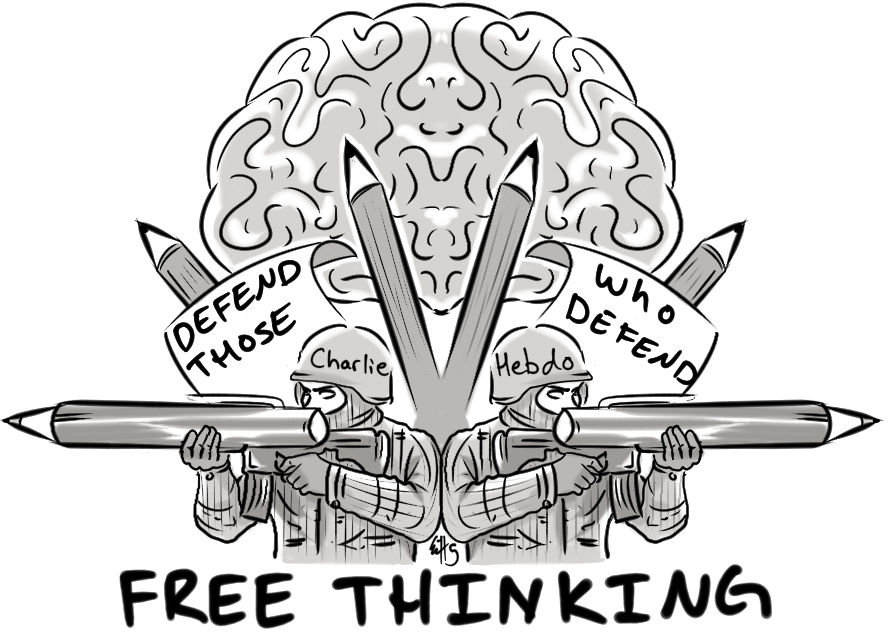On Wednesday, the office of the popular French satire magazine, Charlie Hebdo, was attacked by two brothers, ages 32 and 34, killing 10 members of Charlie’s staff and two police officers. The attackers pulled up in a particularly not-intimidating sedan armed to the teeth ready to fight a war of ideas against the cartoonists armed only with their pencils.
According to the Telegraph, these two men are part of a new trend in Islamic extremism in which former losers (they worked a series of minimum wage jobs, tried to become rappers and were avid pot-smokers) are “born again” as psychopaths and are inspired by their newfound faith to kill. In this case, they kill to avenge the honor of their prophet, which they perceived as having been damaged by these cartoons.
In actuality, the magazine hasn’t targeted the character of the Prophet Muhammad himself in their cartoons but his followers and their interpretation of Islam. For example, Charlie Hebdo published a cartoon showing a Muslim man threatening to decapitate the Prophet Muhammad and calling him an infidel for claiming to be the Prophet, implying that radical Muslims are killing their prophet and what he symbolizes by being so extreme.
What satire offers is rational thought as a medium of expression, and when done right can reflect an unexplored side of an issue. To attempt to silence or kill people who perform satire does not make what they say untrue but demonstrates fear of what they have to say.
Many Muslims in the political sphere have spoken out against these attacks. Most reassuringly, The New York Times reported that the leader of the Lebanese Hezbollah group, Sheikh Hassan Nasrallah, said Islamic extremists have insulted Islam and the Prophet Muhammad more than those who published satirical cartoons mocking the religion.
Charlie Hebdo has been grilling religion, political ideologies and public figures since the ‘60s. Again, this is not because it prints anything that is false, but because it highlights things that are true. In 2006 the magazine caused a firestorm of criticism, which led to lawsuits after reprinting Danish cartoons that depicted Muhammad crying because “it is hard to be loved by idiots.”
This isn’t the first time Charlie Hebdo has been the victim of violence. In November 2011, extremists firebombed its offices after the magazine announced that the Prophet Muhammed was to be the magazine’s guest editor for a week .
Depicted was a cartoon of Muhammed saying, “100 lashes if you’re not dying with laughter!”
After the firebombing, the attackers hacked the magazine’s website to leave the message, “You keep abusing Islam’s almighty Prophet with disgusting and disgraceful cartoons using excuses of freedom of speech. God’s curse be upon you!”
The political situation between Islam and secular France is much more contentious than it is in the United States, as their communities are essentially segregated — but by choice. Neither side really wants to be in contact with the other. French police and fire departments are not wanted in Islamic neighborhoods, referred to as “no go areas” for non-Muslim French people. France also has the largest Muslim population in Western Europe, with roughly 6.5 million followers of the faith.
All of this tension shows the courage that Charlie Hebdo has, though some see this courage as stupidity. The Financial Times’ Tony Barber wrote a column in which he took great pains to ensure the reader that he was not condoning the attacks but that the Charlie should have used more “common sense” in order to avoid provoking violence. Former White House Press Secretary Jay Carney struck a similar chord in 2012 when Charlie published more cartoons depicting the Prophet saying, “We have questions about the judgment of publishing something like this.”
This stance castrates the spirit of the freedom of speech, which contends that no ideology or person is beyond criticism. How can satire exist in today’s world without addressing the most glaring black hole of humorlessness of Islamic extremism?
What Charlie Hebdo does, much like “The Daily Show,” “The Colbert Report” and “South Park,” is empower the masses to think for themselves. If we allow threats of violence to stop people from publicly speaking out against extremism, like we nearly did when Kim Jong-Un tried to stop the release of “The Interview,” then extremism has won.
The editor-in-chief of Charlie Hebdo has stated that they will print as many as 3 million copies this coming Wednesday, including more cartoons of the Prophet Muhammad.”











